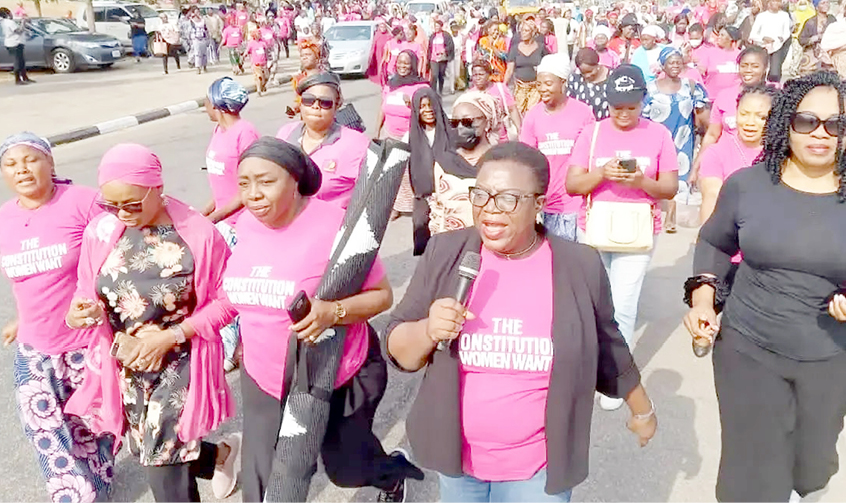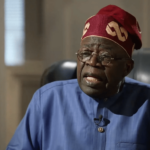One year into the court ruling that mandated the federal government to enforce the 35 per cent affirmative action, women groups in Nigeria continue to push for the implementation, calling on successive governments to heed the court ruling. In this report, Daily Trust on Sunday spoke to some of the plaintiffs to get their reactions to the implementation progress by the federal government.
A sigh of relief came for Nigerian women following the April 6, 2022 court ruling that ordered the federal government to comply with the 35 per cent affirmative action to ensure more women in elective and appointive positions in the country.
The landslide ruling according to women groups in Nigeria finally gave a nudge to the implementation of the 35 per cent affirmative action for women inclusion as contained in the National Gender Policy NGP (2006).
Though the declining number of women in the country’s leadership space had made the NGP seem like a document written in an attempt to circumvent criticisms on gender imbalance, with little or no will for implementation, one year down the line, the women groups (plaintiffs) are optimistic about the implementation of the 35 per cent affirmative action.
Niger Delta: Thoughts on a nascent P.I.A. revolution
VP’s lodge project stalled after gulping billions of naira
To celebrate the one-year anniversary of the 35 per cent affirmative action, the Nigerian Women Trust Fund (NWTF) and eight co plaintiffs in a statement released on April 6, 2023 and made available to the press, demanded an immediate implementation of the court judgment by the President-elect, Ahmed Bola Tinubu, in all appointive positions in his cabinet.
Also, in compliance to this, they sought the current administration to follow through with the implementation as demanded by the judgment, requesting the Ministry of Justice to withdraw its appeal on the court ruling to allow women enjoy the dividends of democracy.
Lamenting the failure of government to implement the court ruling, Mrs Mufuliat Fijane, Chief Executive Officer of NWTF, who spoke to Daily Trust on Sunday on behalf of Nigerian women, said women are “demanding that the government obeys the court judgment and implement its own policy. But if they fail to, we may have to still go to court again for enforcement,” she said.
Fijane added that she prays the incoming government will begin implementation of the 35 per cent affirmative action for women in public offices.
In a democracy like Nigeria, the existential problem of sparse women in decision making and leadership positions has continued to call for renewed efforts from gender experts and activists to achieve equity and inclusion.
Prior to the 2023 general elections, gender experts had expressed worry over the low number of women in leadership positions. Meanwhile, the outcome of the just concluded election had little or no change on the status quo.
Daily Trust on Sunday reports that since the 1995 declaration made at the fourth world conference on women in Beijing which Nigeria is a signatory to, the implementation of the said block for women inclusion in the populous black nation had been fickle.
Just like successive administrations, experts revealed that President Muhammadu Buhari reneged on his campaign promise of 35 per cent of his appointments to females. Moreover, in 2015 only six out of the 36 ministers appointed where female while seven out of 43 ministers in 2019 were women. This according to gender analysts is a reduction from the 30 per cent achieved by his predecessor.
Prior to the April 2022 court ruling in favour of Nigerian women, a piece of legislation to back the quota for women had been a mirage, with legislators in 2021 throwing out all women bills in the 1999 constitutional amendment.
Dr Idayat Hassan, director of the Centre for Democracy and Development (CDD), said it was unfortunate that the federal government is yet to comply with the judgment.
“It was a great surprise to realize that the matter was appealed by the federal ministry of Justice Abuja on April 14, 2022 in contradiction to President Muhamadu Buhari’s acceptance of the judgment through the federal Ministry of women affairs. Therefore, this is a call to the Ministry of Justice to withdraw the appeal filed by the federal government challenging the landmark victory on 35 per cent Affirmative Action delivered by a Federal High Court in Abuja on Wednesday April 6, 2022 and a demand for the immediate implementation of the judgment of the court by the President-elect Bola Ahmed Tinubu in all appointive positions in his cabinet. Finally, this is a call to the 10th Assembly to write their name in the golden book of history by passing the gender bill that failed in the 9th Assembly,” she said.
According to a 2022 report by the National Bureau of Statics (NBS) on access of women to ministerial positions in Nigeria, it showed that since 1999, women have occupied only 13.73 per cent of ministerial appointments, while their male counterparts have hit a record 86.27 per cent.
The number of women in the National Assembly have also revealed the under representation of women in the bi-cameral legislature of 469 seats.
The just concluded 2023 election results announced by INEC indicates that only 17 women made it to the National Assembly, with three female senators-elect and 14 female House of Representatives members.
This leaves the 10th assembly with 3.62 per cent female representation and the males with 96.3 per cent in the legislative arm.
This gender inequality according to women groups is what they seek to address in the coming years.
Daily Trust on Sunday reported that out of the 988 state assembly seats across 36 states of the federation, only 48 female lawmakers were elected, which represents 4.85 per cent.

 Join Daily Trust WhatsApp Community For Quick Access To News and Happenings Around You.
Join Daily Trust WhatsApp Community For Quick Access To News and Happenings Around You.


